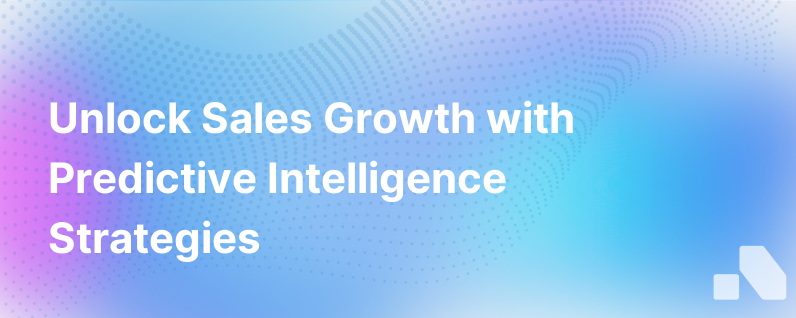
Predictive intelligence, also known as predictive analytics, is reshaping the business paradigm and unlocking new pathways of growth. It represents the future of decision-making, where businesses leverage data-driven insights to anticipate outcomes and make proactive strategic decisions.
In this post, we'll explore what predictive intelligence is, how it works, its scope, and its impact on businesses, with a particular focus on the B2B sector.
Harnessing the Power of Predictive Intelligence
Predictive intelligence is a data-driven technique that involves the use of data, statistical algorithms, machine learning, and AI to predict future outcomes based on historical and current data. These predictions guide companies in making strategic decisions, reducing risks, and improving overall performance.
Predictive intelligence can predict customer preferences, market trends, and potential risks, among others. It's like having a crystal ball, but instead of magic, the power behind it is big data. The sheer volume, variety, and velocity of data today provide an opportunity for businesses to forecast future events accurately.
Key Ingredients of Predictive Intelligence
Predictive modeling, the backbone of predictive intelligence, mainly involves three components:
- Data: The quality and quantity of data are of paramount importance. It is recommended to have ample sample size and a variety of data collected over time for more accurate predictions.
- Analytics Techniques: These are mathematical models and statistical techniques used to identify patterns in data and predict future outcomes.
- Assumptions: Assumptions are conjectures about relationships between data elements and expected future scenarios.
Predictive Intelligence in the B2B Landscape
For B2B marketers, predictive intelligence gives them the power to leverage data to anticipate future customer behaviors and trends to drive growth.
Sales and Marketing Optimization: AI-driven predictive intelligence can analyze past sales and marketing data to predict the most productive sales opportunities and leads, helping to prioritize resources and efforts. This means more effective targeting and a boosted rate of conversion.
Customer Retention: By predicting customer behavior, companies can identify clients who are likely to churn and proactively take steps to keep them on board. This approach can significantly reduce customer acquisition costs and foster a loyal consumer base.
Demand Planning: Predictive intelligence tools can analyze factors influencing product demand such as market trends, seasonal changes, and economic indicators, allowing businesses to adjust their production and avoid supply imbalance.
These advantages streamline B2B operations, reduce risk, and foster strategic growth, making predictive analytics an indispensable tool in the modern business era.
Creating a Competitive Edge with Predictive Intelligence
Let's now look at how predictive intelligence can provide businesses a competitive advantage:
- Understanding Customers' Future Needs: By accurately predicting future customer trends, businesses can proactively adjust their product development and marketing campaigns.
- Optimizing Resources: Using predictive models to assess critical business areas can maximize the utilization of resources. For example, predicting sales trends can optimize inventory management, leading to cost savings.
- Improving Sales Forecasts: Predictive models can help teams forecast sales trends more accurately, leading to improved budget projections and planning.
- Making Data-Driven Decisions: Decision-making backed by predictive intelligence is more reliable and strategic. Instead of relying on intuition, businesses can move based on data-driven insights.
Choosing a Predictive Intelligence Solution
A predictive intelligence company like Aomni equips businesses with AI-powered tools for strategic planning. It delivers real-time account research, actionable competitive insights, and personalized sales content with zero effort required. Aomni's predictive intelligence understands target markets, aggregates vital data, and synthesizes information into actionable steps for businesses.
Conclusion
Predictive intelligence is not a fad; it's a revolution in decision making. The businesses that recognize and capitalize on its power stand to gain a formidable competitive edge.
The ability to foresee market trends, customer demands, and other pivotal scenarios enables enterprises to shape their strategic planning proactively. It's not about seeing the future; it's about using data to shape it. With predictive intelligence, we find ourselves at a juncture in history where we can look ahead, anticipate situations, and take strategic steps today to shape the future we want to see. If you want to remain competitive in this rapidly evolving landscape, making predictive intelligence a cornerstone of your strategic planning is a wise move to make.